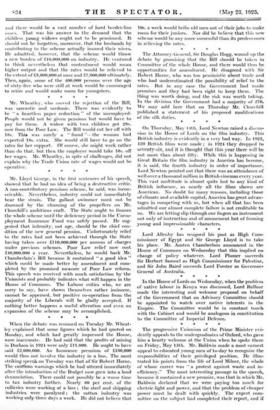Mr. Lloyd George, in the first sentences of his speech,
showed that he had no idea of being a destructive critic. A non-contributory pensions scheme, he said, was incon- ceivable. Nevertheless, industry could not immediately bear the strain. The gallant swimmer must not be drowned by the churning of the propellers on Mr. Churchill's ambitious craft. The State ought to finance the whole scheme until the deficiency period in the Unem- ployment Insurance Fund was safely passed. He sug- gested that infirmity, not age, should be the chief con- dition of the new general pension. Unfortunately relief to the rates had not been achieved through the State having taken over £110,000,000 per annum of charges under previous schemes. Poor Law relief now cost £40,000,000 a year. Nevertheless, he would back Mr. Chamberlain's Bill because it contained " a good idea " which could be made better by amendment and com- pleted by the promised measure of Poor Law reform. This speech was received with much satisfaction by the Unionists and probably indicates what will happen in the House " of Commons. The Labour critics who, we are sorry to say, have shown themselves rather insincere, cannot be appeased, but positive co-operation from the majority of the Liberals will be gladly accepted. If nothing better happens a useful alteration and even au expansion of the scheme may be accomplished.










































 Previous page
Previous page